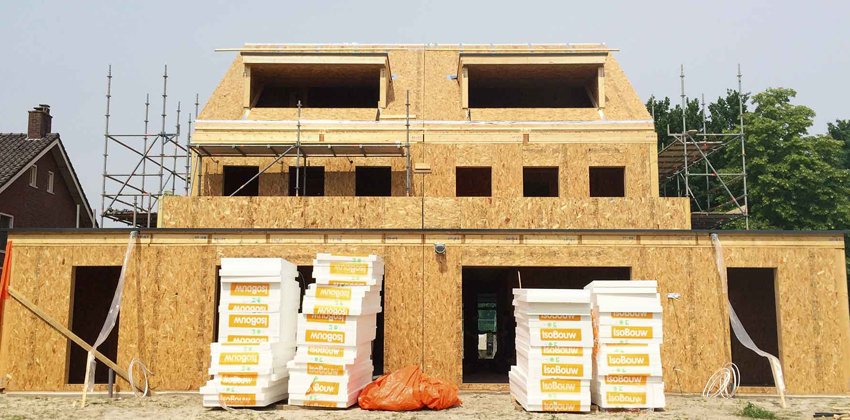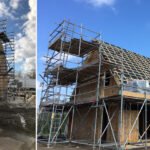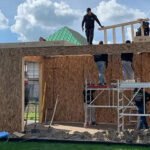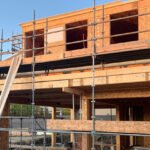
How SIPs Increase the Value of Your Property
Property value is determined by more than just location and square footage. Today’s buyers and investors are increasingly focused on energy efficiency, comfort, and long-term durability. In Europe—where housing demand is high and sustainability regulations are tightening—these factors can significantly influence market value.
Structural Insulated Panels (SIPs) offer unique advantages that make homes more valuable, not only in terms of energy performance but also in comfort, aesthetics, and lifecycle costs. For homeowners and developers alike, building with SIPs is not just about construction speed—it is about creating properties that retain and increase their value over time.
Energy Efficiency as a Value Driver
Energy costs across Europe are rising, and buyers are prioritizing homes that promise lower utility bills. SIPs deliver superior insulation thanks to their Neopor® core and airtight construction.
- Lower Bills: A SIP home can cut heating and cooling costs by up to 50% compared to conventional builds.
- Smaller Systems: Reduced energy demand allows for smaller HVAC systems, which lowers upfront costs.
- Resale Value: Energy-efficient homes consistently sell at a premium, as buyers recognize the long-term savings.
Real estate studies confirm that homes with higher energy ratings (such as EPC “A”) sell faster and at higher prices. SIPs make it easier to achieve these top ratings.
Comfort and Lifestyle Appeal
Beyond energy savings, comfort is a critical factor in property value. SIPs create stable indoor environments with consistent temperatures and excellent sound insulation.
- Thermal Comfort: With airtight panels, indoor climates remain steady year-round.
- Acoustic Benefits: SIP walls block external noise, making homes more appealing in urban or high-traffic areas.
- Healthier Living: Controlled ventilation systems ensure good air quality, reducing issues with mold or dampness.
Buyers are increasingly willing to pay more for properties that support well-being, especially in competitive urban markets.
Durability and Low Maintenance
A home that requires fewer repairs is inherently more valuable. SIPs offer exceptional durability:
- Resistance to Mold and Pests: OSB4 facings and insulated cores prevent common building problems.
- Structural Integrity: SIPs resist warping, settlement, and cracking.
- Minimal Maintenance: With fewer weak points, SIP homes need less upkeep compared to traditional builds.
This long-term reliability reassures buyers and investors, boosting market confidence in SIP-built properties.
Design Flexibility and Modern Aesthetics
Property value is also influenced by design. Buyers want homes that are modern, attractive, and adaptable to different styles. SIPs provide this flexibility:
- Open Floor Plans: Strong panels allow for wide spans without internal load-bearing walls.
- Multiple Cladding Options: SIPs support brick, render, wood, or composite facades, making them adaptable to local aesthetics.
- Future-Proof Design: Homes can be easily integrated with renewable energy systems like solar panels or heat pumps.
Architects value SIPs for their versatility, which translates into higher perceived value in the market.
Market Trends Supporting SIPs
In Europe, several trends are making SIP homes more valuable:
- Sustainability Regulations – Buyers know that stricter energy codes are coming, and they want homes that are already compliant.
- Rising Energy Prices – The volatility of gas and electricity markets increases demand for energy-efficient housing.
- Investor Demand – Institutional investors are prioritizing ESG-compliant housing, where SIPs fit perfectly.
- Urban Growth – In dense cities, faster delivery and higher energy performance make SIP homes more competitive.
These trends indicate that the value gap between SIP homes and conventional builds will only grow in the years ahead.
The Financial Perspective
From an investment perspective, SIP homes deliver multiple financial benefits:
- Lower Operating Costs: Energy savings increase disposable income for owners and tenants.
- Higher Rental Yields: Tenants are willing to pay more for comfortable, energy-efficient homes.
- Stronger Asset Value: Properties aligned with EU sustainability goals are more attractive to investors.
- Future-Proofing: Avoiding retrofits saves significant costs as regulations tighten.
In short, SIPs ensure that property value is not just maintained but actively enhanced over time.
Addressing Misconceptions
Some skeptics question whether prefabricated homes can achieve the same value as traditional builds. The reality is the opposite:
- SIP homes outperform many conventional houses in energy ratings, a key determinant of value.
- Prefabrication ensures higher quality and fewer defects, which supports resale value.
- Modern buyers see SIPs not as “cheap alternatives” but as smart, sustainable investments.
Conclusion
The value of property in 2025 and beyond is increasingly tied to energy efficiency, comfort, durability, and sustainability. SIPs deliver on all these fronts, making them a proven way to increase property value.
For homeowners, this means higher resale potential. For developers, it means faster sales and better returns. For investors, it means assets that are secure, future-proof, and ESG-aligned.
SIPs are not just about building faster—they are about building smarter, creating properties that are worth more today and tomorrow.





Add a comment